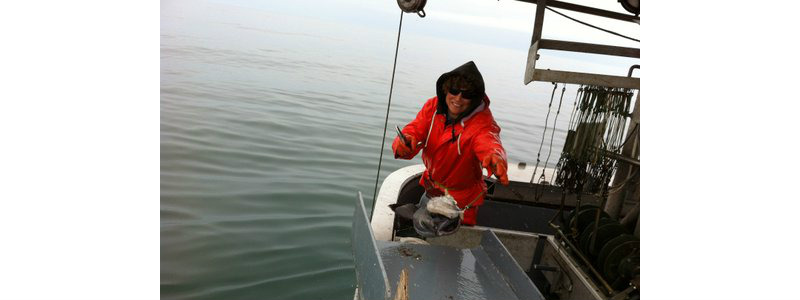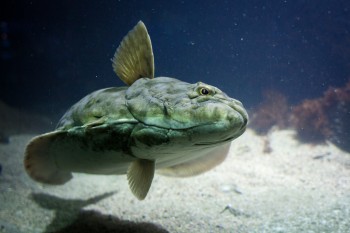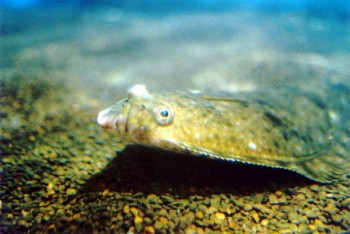Pacific halibut, one of the region’s most iconic fish, is being treated in some fisheries no better than your daily trash.
Halibut abundance has declined over the past 15 years, and Alaska halibut fishermen have reduced their catch to conserve stocks for the future. Washington-based trawlers, on the other hand, are still allowed to catch, kill, and discard as bycatch as many halibut now as they did 20 years ago. As a result, trawl fisheries killed and discarded seven times more halibut in Alaska’s Bering Sea/Aleutian Islands during 2014 than halibut fishermen landed in the same area. That’s 1.05 million halibut killed as bycatch in trawls versus 149,000 halibut caught by directed halibut fishermen. In effect, halibut has been reallocated from the fishermen who are conserving the resource to the trawlers that are wasting it – along with the future of all who depend on halibut for sustenance, livelihood, or sport.
To date, U.S. fisheries management has done little to solve this problem despite rules requiring managers to reduce bycatch and provide for the sustained participation of community-based fishermen.
Given that the Bering Sea is the nursery ground for all North Pacific halibut, reducing bycatch in this area is a coast-wide issue. In fact, juvenile halibut tagged in the Bering Sea have been recovered as far south as California. The Bering Sea bycatch affects subsistence, commercial, and recreational halibut fishermen – and fishery-dependent communities – in Alaska, Canada, Washington, Oregon, and California. And with the popularity of halibut on restaurant menus, what happens in the Bering Sea, quite simply, affects everyone who depends on or cares about the halibut resource.
The decline in Pacific halibut stocks reinforces why managers need to recommit to protecting fish stocks and reducing bycatch. Catch limits intended to protect the population of a given fish stock mean nothing if the same fish is being killed as bycatch in another fishery. Poor bycatch management also means coastal fishermen who target a fish such as halibut for their livelihoods are denied fishing opportunities and revenue due to the wasteful practices of others.
The foundation of good fisheries management is a strong federal law that ensures all fisheries are managed in a way that maximizes the long-term health of the resource and promotes thriving coastal economies. The Magnuson-Stevens Fishery Conservation and Management Act is up for reauthorization, and some critics are looking to weaken limits on catch and bycatch even when it hurts the resource and the fishing communities that depend on it. The Pacific halibut bycatch situation highlights why the law needs to be strengthened to protect fish and fishing communities.
During the first week of June, the North Pacific Fishery Management Council will vote on an amendment to reduce halibut bycatch in the Bering Sea. Alaska Longline Fishermen’s Association and other halibut groups are calling for a 50 percent reduction in halibut bycatch caps (the amount of halibut a fishery can catch as bycatch). If you would like to voice your support for lower halibut bycatch caps, the Council welcomes both written and oral testimony.
Written comments can be sent to npfmc.comment@noaa.gov and must be submitted by 5 pm Alaska time on May 26. Please visit the Alaska Longline Fishermen’s Association website at www.alfafish.org for more information.





Pingback: America’s Gold is in Our Fisheries | Marine Fish Conservation Network
Why don’t trawlers and halibut fishermen work together and instead of returning bycatch to the ocean, use it toward their quota of halibut they are allowed to catch….
Pingback: Fisheries Law Needs to Protect Fishing-Dependent Communities and Small-Boat Fishermen | Marine Fish Conservation Network
Hello Marine Fish Conservation Network,
I am the owner of Sofa King and I would love to sponsor your company in the fish saving environment
Please contact me if you wish to be sponsored, because I have a strong love for my nature. And with my wealth, I want to spend it well!
Thank you,
James Bondson
Why is Trawling a method of fishing that bulldozes everything living on the ocean floor still in operation? It produces too much bycatch and waste(You would think the overkill would be used in animal foods). Our oceans can bounce back if we break some generational traditions and piss off a few fishermen.
There is a need for a Super-Fund for the boat owners after all our government has continued to allow this type of invasive fishing. If there was a fund it could help a fisherman that has a boat and cannot fish anymore because of a law. It could help them make their boat operational to fish another way or their boat could be bought out.
A little bit of security goes a long way.
The only time I have ever heard of any relief of this kind is when the Gulf Oil Spill ruined the shrimpers.